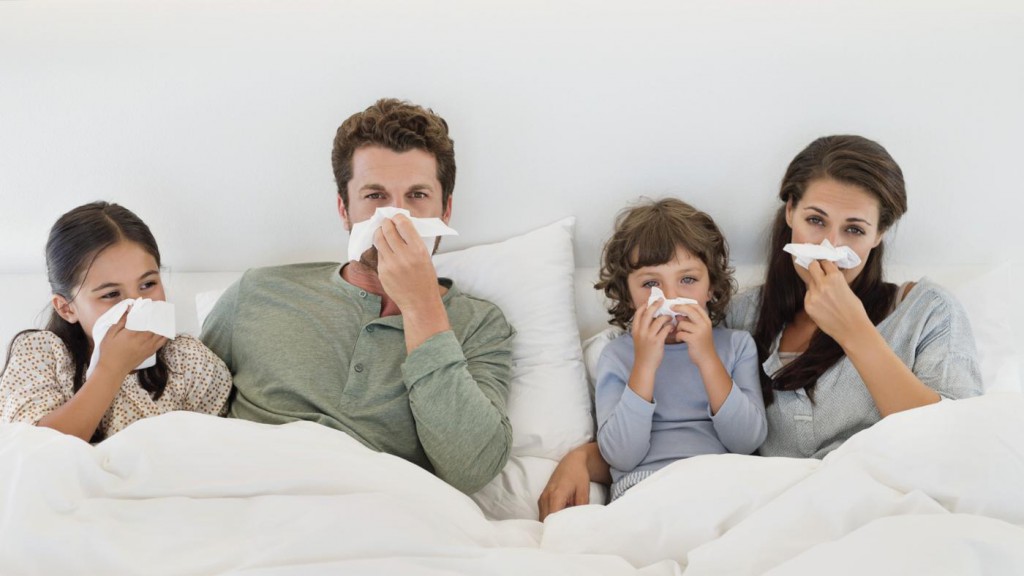Canadian Health&Care Mall Healthcare Accents During Flu Epidemic
The flu season is in full swing, and this years it may turn out to be the worst in a decade. The main concern is the spread of the so-called Australian flu – the strain known as A(H3N2), which has already caused over 70 deaths in Australia. Of course, few people have a real risk of dying of flu; high risk groups include the elderly, small children, pregnant women, and people with a compormised immune system. But for the rest the flue (especially the Australian variety) is not a walk in the park either: fever, fatigue, sore throat, night sweats, cough and running nose incapacitate most people for about a week.

Many of us do not prepare for the flu epidemic in any way and just hope not to catch the virus; and if we do, we just stay in bed doing nothing or – even worse – take antibiotics. This is not a wise course of action: in fact, there are many science-based tips that you should follow to reduce the risk and consequences of flu. We have spoken to the medical customer support team of Canadian Health&Care Mall https://www.canadahealthcaremall.com - a large online pharmacy service – to find out how best to behave during the flu season; here are their main tips.
1) Get vaccinated. Some people claim that year’s vaccine is not effective, but they are wrong; in fact, we are still not sure what the exact efficiency rate of the flu jab is against the Australian flu, the usual success rate is 40-60% among the population under the age of 65, and it is much higher among senior citizens. Your health insurance should usually cover the vaccine, but if it doesn’t, it is not expensive, and you don’t even need to get a doctor appointment, since many pharmacies stock the flu vaccine. Of course, it may seem like a hassle to wait out in the cold in a queue to get your jab, but it is worth it: even at a 40% success rate, you are protecting not only yourself but also your family members, who could otherwise contract the flu from you. Contrary to a common misconception, you cannot actually get the flu from the shot, since the virus in it is all dead; however, you may experience some muscle pain in the arm, which is nothing to worry about.
2) Don’t reach for antibiotics. Here’s what Mannie Kapur, a specialist of the Canadian Health and Care Mall support team, told us: “Unfortunately, many people still find it hard to distinguish between bacteria and viruses, so with the arrival of each new flu season we get hundreds of messages from customers who want to know which antibiotics are “the best against flu”. Of course, every time we have to explain that none of them are: antibiotics simply don’t work against flu, because they are completely useless against viruses. Antibiotics help against bacterial infections, and those usually do not express themselves in flu-like symptoms. Of course, there is always the placebo effect: if you an antibiotic against the flu, you may feel better, your mood will improve, your fatigue will reduce. But it is thanks to your brain, not to the pill. Immunomodulators and antiviral meds are sometimes prescribed to people who are at risk, but no meds can kill a virus – only your own immune system can.
3) Stay hydrated and clean. You are always advised to drink at least 1.5 liters of water a day, but if you have flu, it’s better to increase the amount to 2 liters a day. Hydration plays an important role in the proper functioning of the immune system and metabolism – and it can prevent you from feeling the false “dehydration hunger” when you stay at home: sometimes we think we want to snack, when in fact our body needs water. Another thing is to keep your hands clean: it may seem like your grandmother’s advice, but in fact washing your hands with soap several times a day helps stop the virus from spreading in your family.
4) Be careful with those lymph nodes. Many people who go down with flu experience an enlargement of the lymph nodes in their neck, which can be significant. It is a common reaction, but if the lymph nodes don’t go back to their original size two weeks after you’ve had the flu, go to the doctor. Even if you have all the flu symtptoms, it doesn’t mean that it’s necessarily flu: many serious viruses can mimic influenze. Mononucleosis (caused by the Epstein-Barr virus), cytomegalovirus infection, and toxoplasmosis are among the possible culprits that can stay in your system for many years and relapse, sometimes even threatening your life (or the life of your baby, if you are a pregnant woman).
5) Buy some symptom-relieving medication. Kapur continues, “Of course, even though antibiotics don’t help and there is no sure way to get your immune system to fight the virus quickly, it doesn’t mean that there is nothing you can do. At Canadian Health & Care Mall, we do stock tested and effective medications to reduce the nasal symptoms, such as running and congested nose. On the other hand, we advise you not to take paracetamol against fever unless it become seriously high; remember, fever is the way your body fights the virus.”
Of course, none of the tips above can give you a 100% protection against the flu or cure the disease as fast as you would like. You will still have to take a few days off work and perhaps stay in bed. However, we do hope that our simple advice will help you prepare more efficiently for the next flu season.













